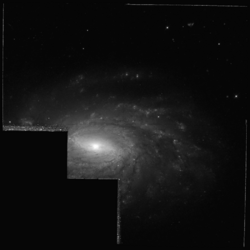Astronomy:NGC 5970
From HandWiki
Short description: Barred spiral galaxy in the constellation Serpens
| NGC 5970 | |
|---|---|
 NGC 5970 imaged by Hubble Space Telescope | |
| Observation data (J2000 epoch) | |
| Constellation | Serpens Caput |
| Right ascension | 15h 38m 29.96s[1] |
| Declination | +12° 11′ 11.9″[1] |
| Redshift | 0.00661[2] |
| Helio radial velocity | 1974 km/s[2] |
| Distance | 91.91 ± 0.65 Mly (28.18 ± 0.20 Mpc)[3] |
| Apparent magnitude (V) | 11.61[1] |
| Apparent magnitude (B) | 12.00[1] |
| Characteristics | |
| Type | SB(r)c[4] |
| Other designations | |
| UGC 9943, MCG+02-40-006, PGC 55665[2] | |
NGC 5970 is a large barred-spiral galaxy located about 90 million light years away in the constellation Serpens Caput. It appears to have two satellite or companion galaxies. It is a member of the Virgo Cluster of galaxies.[2] It was discovered on March 15, 1784, by the astronomer William Herschel.[5]
LINER-type emission has been detected from the disk of NGC 5970.[6]
Observations
NGC 5970 can be seen 1° southwest of the star Chi Serpentis. A faint halo of dust can be seen around the galaxy's outer spiral arms.
References
- Sky and Telescope magazine/June Issue/2012/pg.56-57
- ↑ 1.0 1.1 1.2 1.3 "Search specification: NGC 5970". HyperLeda. Université Claude Bernard Lyon 1. http://leda.univ-lyon1.fr/ledacat.cgi?o=NGC%205970.
- ↑ 2.0 2.1 2.2 2.3 "NGC 5970". SIMBAD. Centre de données astronomiques de Strasbourg. http://simbad.u-strasbg.fr/simbad/sim-basic?Ident=NGC+5970.
- ↑ Tully, R. Brent (2013). "Cosmicflows-2: The Data". The Astronomical Journal 146 (4): 86. doi:10.1088/0004-6256/146/4/86. Bibcode: 2013AJ....146...86T.
- ↑ "Results for object NGC 5970 (NGC 5970)". NASA/IPAC Extragalactic Database. California Institute of Technology. https://ned.ipac.caltech.edu/byname?objname=NGC%205970&hconst=67.8&omegam=0.308&omegav=0.692&wmap=4&corr_z=1.
- ↑ Seligman, Courtney. "New General Catalogue objects: NGC 5950 - 5999". http://cseligman.com/text/atlas/ngc59a.htm#5970. Retrieved 2021-02-19.
- ↑ James, P. A.; Percival, S. M. (2020). "Diffuse LINER-type emission from extended disc regions of barred galaxies". Monthly Notices of the Royal Astronomical Society 496: 36–48. doi:10.1093/mnras/staa1369.
External links
 |
